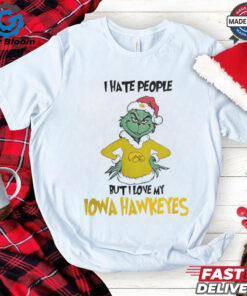I Hate People But I Love My Iowa Hawkeyes Grinch Merry Christmas Shirt
The early morning sun streams warm and rich into the I Hate People But I Love My Iowa Hawkeyes Grinch Merry Christmas Shirt , dispelling the nocturnal chill and making the air delightful beyond expression. We are hurled along between close-shutting crags that are the type of solidity, yet seem to waver and topple at their summits as we gaze at them, cut strongly against the tremulous blue of the sky. Our ears are assaulted by the crashing of iron against iron and steam shrieking at the wind, and by the roar and dashing of enraged and baffled water.
 ()
()I Hate People But I Love My Iowa Hawkeyes Grinch Merry Christmas Shirt hoodie, tank top, sweater and long sleeve t-shirt: best style for you
Swimsuit women tankini black tankini tops for women swimwear tankini sets for I Hate People But I Love My Iowa Hawkeyes Grinch Merry Christmas Shirt swimwear halter sexy black bathing suits for women beachwear swimsuit cover up long dress cover up cover up pants for swimwear women sexy tankini bathing suits for women womens bathing suits one piece push up tankini bathing suits for women pink one piece swimsuits for women girls rash guard swimwear womens bathing suits swimsuits for women one piece.
 ()
()In Korea, where it’s called Seollal, there’s also a complicated political history behind the I Hate People But I Love My Iowa Hawkeyes Grinch Merry Christmas Shirt. According to UC Davis associate professor of Korean and Japanese history Kyu Hyun Kim, Lunar New Year didn’t become an officially recognized holiday until 1985 despite the fact that many Koreans had traditionally observed it for hundreds of years. Why? Under Japanese imperialist rule from 1895 to 1945, Lunar New Year was deemed a morally and economically wasteful holiday in Korea, Kim said, despite the fact that Lunar New Year has always been one of the country’s biggest holidays for commercial consumption. But Koreans never stopped celebrating Lunar New Year simply because the government didn’t recognize it as a federal holiday, Kim said. So as South Korea shifted from a military dictatorship towards a more democratized society in the 1980s, mounting pressure from the public to have official holidays and relax the country’s tiring work culture led to the holiday being added to the federal calendar as a three-day period.
 ()
()- Production Time: All orders are processed within 3 – 4 business days.
- Shipping Time: You will receive your order anywhere from 5 – 10 business days (depending on the shipping method you chose) from the date that it is shipped out, not the date the order is placed.
- Return & Exchange: A full-refund of your purchase! Absolutely risk-free, no question asked. In case of defective or damaged goods, we will send a replacement to you (No any extra fee) within 30 days since your purchase.
- Tracking Number: When available, we will send you the tracking number with the confirmation email so that you can track the package online.
- Worldwide Shipping Available: At limotees, we ships products to over 100 countries worldwide. Shipping rates and fees may vary depending on your country or region.
- If you have any other queries, please feel free to email us at [email protected]
This Flowers having a Weird Mom builds character Xmas Day T-shirt, hoodie, sweater, tank top, long sleeve, and V-neck t-shirt is a made-to-order product, It is designed by TeeJeep LLC. This is a limited edition product was made in the USA.
Brand: TeeJeep Clothing LLC, Inc. - An online fashion company in the USA
At TeeJeep LLC, we have provided quality T-shirts that are sure to make you feel comfortable and cool even in the scorching heat or cold weather. We also seek to provide our customers with the highest level of customer service possible by adhering to customer satisfaction policies and an open communication style. T-SHIRT FEATURES: - High quality 100% Soft cotton (fiber content may vary for different colors) UNISEX shirt. HOODIE and SWEATSHIRTS FEATURES: - 50% Cotton; 50% Polyester (fibre content may vary for different colors) - IMPORTANT: Runs true to size. Are buyers responsibility to consult the size chart before placing the order. - The design is printed on the t-shirt with a digital printer. - If you want to CUSTOMIZE more this product, please send me a message. CARE: - Machine wash, with cold water, and inside out - Tumble dry on low or hang to dry - DO not iron directly on the design ♥ HOW TO ORDER T-SHIRT, HOODIE, SWEATSHIRT , LONGSLEEVE








